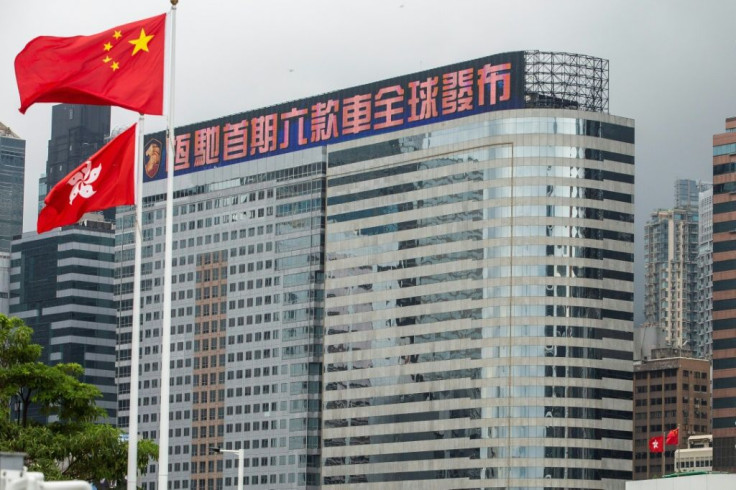Evergrande: China's Fragile Housing Giant
Chinese housing giant Evergrande is one of the country's largest private conglomerates and world's most indebted property developer, teetering on the brink of bankruptcy after years of rapid growth and a buying spree.
Crippled with debt, the firm's Hong Kong-listed shares have collapsed this year on mounting fears for its financial health.
The group -- which claims to employ 200,000 people and indirectly generate 3.8 million jobs in China -- has said it is trying to avoid a bankruptcy that could have major repercussions on the country's economy, and possibly the world.
Here's what we know about Evergrande.
With a presence in more than 280 cities, Evergrande is one of the largest private companies in China and one of its leading real estate developers.
The firm made its wealth over decades of rapid property development and wealth accumulation as China's reforms opened up the economy.
Its president, Xu Jiayin -- also known as Hui Ka Yan in Cantonese -- was at one point China's richest man but has seen his wealth slashed from $43 billion in 2017 to less than $9 billion now.
While predominantly a real estate firm, in recent years the group has embarked on an all-out diversification.
Outside of property development, it is now best known in China for its football club Guangzhou FC, formerly Guangzhou Evergrande.
The group is also present in the flourishing mineral water and food market, with its Evergrande Spring brand. It has also built children's amusement parks, which it boasted were "bigger" than rival Disney's.
Evergrande has also invested in tourism, digital operations, insurance, and health.
Some investments have been more successful than others. It's Evergrande Auto electric car, founded in 2019, is not currently marketing any vehicles at all.
In short: debt.
Evergrande has increased acquisitions in recent years, taking advantage of the frenzy in real estate.
The group said earlier this month that its total liabilities had swelled to 1.97 trillion yuan ($305 billion) and warned of "risks of defaults on borrowings".

In August the rating agency Moody's -- worried about the repayment capacity -- lowered its strength rating to "negative", while Fitch and Standard & Poor's have since followed suit.
Evergrande shares have collapsed around 80 percent since the start of this year, and some contractors and suppliers have complained about not being paid on time, while some creditors are demanding immediate payback of loans.
Last year, a leaked letter from Xu apparently asked for permission from regulators to restructure prompted market panic -- although Evergrande later said it was a fake.
However, the ensuing unrest led the group and its investors to agree to the repayment of some 130 billion yuan of debt.
Still, its ability to complete developments and service its debts has been cast into doubt as it struggles to sell properties, meaning it does not have the cash to complete other projects to then sell.
On Tuesday it warned that "ongoing negative media reports" had damaging sales in September, "thereby resulting in the continuous deterioration of cash collection by the Group which would in turn place tremendous pressure on the Group's cashflow and liquidity". That came a day after it insisted it would avoid bankruptcy.
The crisis has led to angry investors who have been left out of pocket to descend on its Shenzhen headquarters to protest.
Real estate is one of the major engines of the Chinese economy, playing a key role in the post-pandemic recovery, and any bankruptcy of such a major company would have major repercussions.
"Evergrande's collapse would be the biggest test that China's financial system has faced in years," Mark Williams, chief Asia analyst at Capital economics, said.
"The most likely endgame is now a managed restructuring in which other developers take over Evergrande's uncompleted projects in exchange for a share of its land bank."
The debt-laden developer reported a drop in first-half profit in late August, as net income fell 29 percent on-year to 10.5 billion yuan, following an earlier profit warning.
It has sold assets, including offloading stakes in holdings such as a Hong Kong-listed internet business, a regional bank and an onshore property firm.
But it is struggling to sell its Hong Kong headquarters.
New rules banning developers from selling unfinished properties have put an end to pre-sales that the group has largely used to finance itself and keep its activities afloat.
Some analysts believe that regardless of its troubles, there is a slim chance Beijing would allow such a behemoth to go under.
Beijing "will not let Evergrande go bankrupt" as it would undermine the regime's stability, analysts at US-based SinoInsider said.
But a state bailout is unlikely, according to Williams, since Evergrande "is the poster child for excess leverage in a sector in which policymakers want to instill more discipline".
© Copyright AFP {{Year}}. All rights reserved.





















